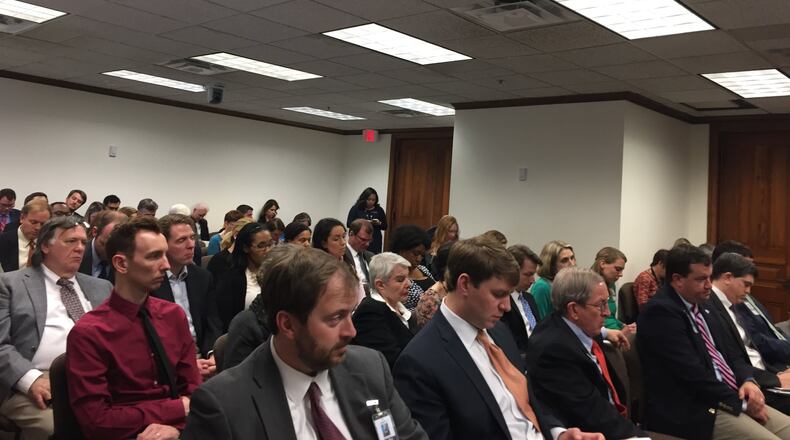Lt. Gov. Casey Cagle said Friday that the new health care legislation put forward by Republican leaders in Congress is not something he could support without important changes.
Cagle’s comments came following a meeting of a new Georgia Senate task force he has formed to try to nudge Congress to shape the federal proposal to Georgia’s benefit. The task force represents the state’s most organized and formal response to the Republicans’ plan so far, and its inaugural meeting Friday drew a large, packed audience of lobbyists and reporters to the state Capitol.
Senators had planned to form the task force even before they knew the contours of the health care bill that’s meant to repeal and replace Obamacare. But with the blueprints out in the open, they voiced concerns.
“We believe that hopefully our voices can be heard, some changes can be made, and we don’t become net losers in this,” Cagle said. “So that all citizens, not just in Georgia but across the country, are treated fairly.”
A particular issue is the way the American Health Care Act, as the proposal is called, would change Medicaid funding for states. Rather than simply paying for services that the eligible patients use, it would give each state a set amount for each eligible patient.
The Republican health care plan would use 2016 Medicaid spending as a baseline for determining how much money each state would get.
The problem, said task force speakers, is that unlike 32 other states, Georgia never expanded Medicaid as Obamacare envisioned. As a result, because Georgia spends less on Medicaid compared to the expansion states, it would get less under the GOP plan than if it had expanded Medicaid.
That 2016 baseline is "not good for Georgia," said Jim Frogue, one of two speakers at the panel, both conservatives. "Being that Georgia was not an expansion state and has a low per-capita Medicaid spend, Georgia is actually punished, unfortunately, for being a fiscally prudent state."
Frogue worked for Newt Gingrich and has advised President Donald Trump’s transition team on health care.
The other speaker, Joe Antos of the American Enterprise Institute, said the goal for most Medicaid patients is to transition to private insurance. Moreover, he said, the end goal is health, not insurance.
He and Frogue both spoke of federal waivers that could be used to free the state from some of Medicaid’s limitations. They hope that can lead to innovation and more efficiency.
Cagle said the solutions the task force seeks are “conservative.” But some of the notes it struck would resonate with progressives too. While GOP leaders in Washington have touted “access” to health care for patients, liberals have complained that access is meaningless if patients can’t afford it.
"Our uninsured population's still extremely high," Cagle said. "And we certainly want to make sure that everyone does have the option and the ability to have access to affordable health care."
About the Author
Keep Reading
The Latest
Featured




